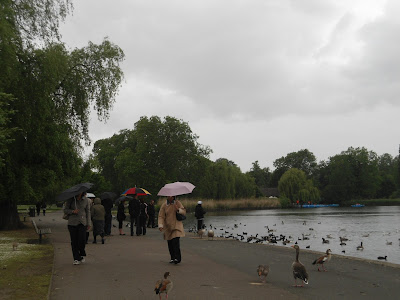 |
| It's not my car but it's the same colour as my suit! |
Mild air is making an occasional and timid appearance in London, but it's usually chased off by its cold front rivals as soon as they spot us walking out without our coats on, thinking that the summer might have arrived.
But the sun kept the cold at bay for us as we toured the hallowed halls and bars of Lord's Cricket Ground, led by my good friend, former boss, and author of the most important cricket book yet written, Mr Tom Rodwell, Chairman of The Lord's Taverners, which is the leading cricket charity in Britain.
Tom wrote '
Third Man in Havana' to document the power of cricket to change lives.
His qualification for doing so was that this is what he achieved as Chairman of Cricket for Change, and the book is both a hilarious and informative account of cricket played around the world by young people who, within conventional classification, we call disadvantaged, but measured by the more demanding standards of spirit and talent, are among the most impressive individuals you are likely ever to meet. Imagine facing a fast bowler when you are partially sighted, going by the sound of a rattle inside the ball.
The ground at Lord's is the headquarters of world cricket, and a paradox : a bastion of exclusivity and privilege and an inspiration and enabler of opportunity for millions through its generous support and donations to charitable enterprises which give young people a chance to participate in the sport.
It's a private club, wealthy, crusty and posh, with a long history - and it's great!
We stood on the balcony of one of the bars overlooking the pitch. A game was under way and I tried and failed to explain exactly what was going on to Elena.
Happy work though, as we supped the cool refreshing ale and watched the white clad figures who occasionally sprang into life before reverting to a form of statuary.
Later that day, we walked across Hyde Park to the Royal Albert Hall where The Philharmonic were due to give a performance of Beethoven, culminating with the great 9th symphony.
Two towering statues of Queen Victoria's husband Prince Albert stand sentinel at the north and south entrances to his eponymous hall.
I stared up at him atop his great plinth outside the south entrance, and wanted to reach up and touch his hand.
'" Oh, she's warm" sprang to mind from the scene in The Winter's Tale, when Hermione's statue comes to life at her husband's touch and she is resurrected by Shakespeare to remind us that anything is possible.
If the stern Victorian Albert came back to life today he might soon find a vacancy as consort to a Queen. Prince Philip, the present occupant of the role is feeling unwell and is 92 years old.
Most of Philip's views would probably coincide with Albert's so we should expect no change in approach from our Monarchy.
Perhaps if Albert's revival coincided with Philip's departure, we would interview him before giving him the job, rather than it being a shoe in?
What was the relationship between Victoria and Mr Brown?
And while we're at it, why does Prince Andrew look so different from Charles and Ann?
The answers' don't matter, these aristocrats are only human it's true.
So why do we treat them like Gods?
 |
| Prince Albert remains domineering in death |
Beethoven had a healthy contempt for Princes.
'There have been many Princes', he said, 'and there will be many more, but there is only one Beethoven'
The performance was electrifying.
The turbulence, terror and pathos of the human condition charge through and trample over your soul as you sit before the spectacle of the huge orchestra and choir in the Albert Hall.
Thanks Victoria, for this hall.
We hope it will always be here, and that future generations will listen in peace as Beethoven reminds them that we must live together in love.
Schiller's great lines to the greatest great tune in the world were rendered with Godlike majesty by the huge choir.
Oh friends, not these tones!
Rather let us sing more
cheerful and more joyful ones.
Joy! Joy!
Joy, beautiful spark of the gods,
Daughter of Elysium,
We approach fire-drunk,
Heavenly One, your shrine.
Your magic reunites
What custom sternly divides;
All people become brothers
Where your gentle wing alights.
Listen up, oh you great leaders of our world, Obama, Putin, Assad, Li Keqiang - reflect on these lines!
All ye tempted to kill and maim to right your wrongs, think again, Gandhi and Martin Luther King showed another way!
Afterwards, we go to The Goats Tavern with friends and drink a few pints of London Pride.
They were good, and we are lucky to be alive.
Leaving the pub, we met two young musicians who had played in the orchestra.
They were delighted that we had enjoyed their performance so much, and talked enthusiastically about the power of music.
If music be the food of love...play on!
















































